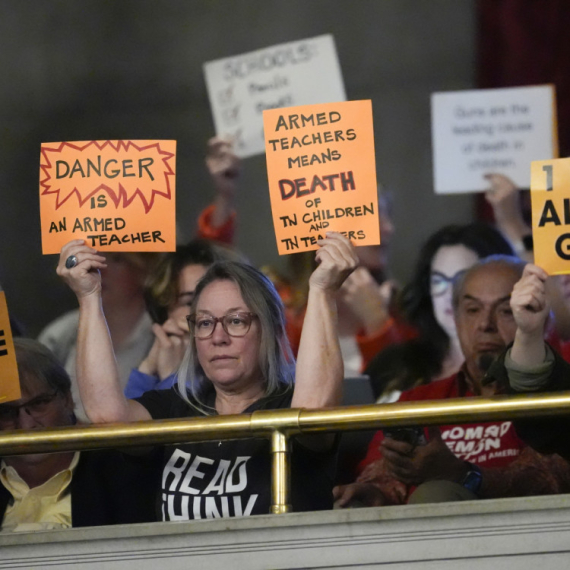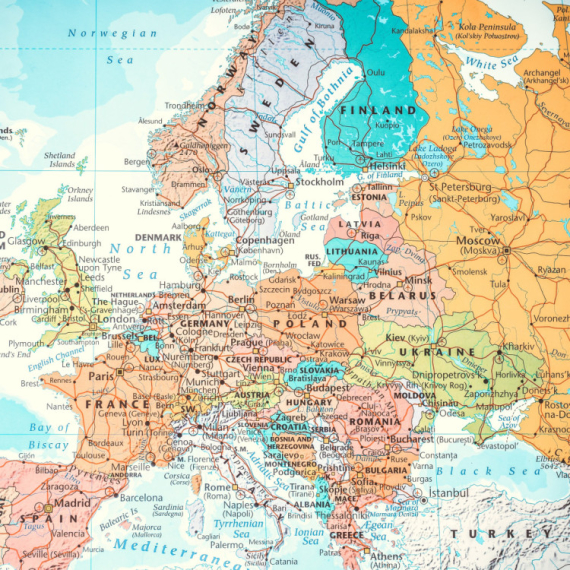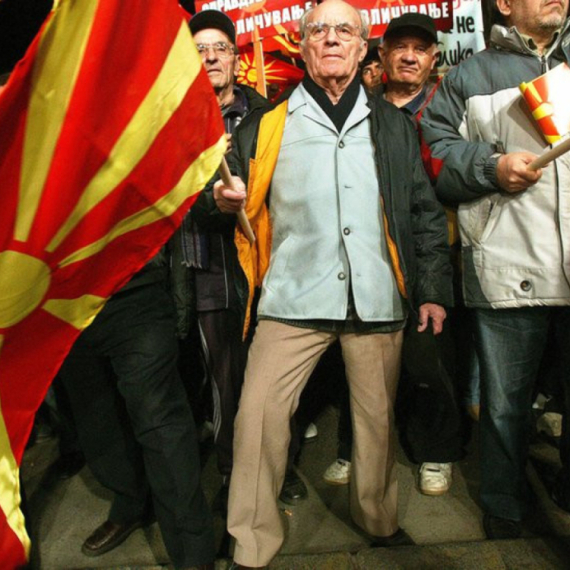You'll live worse, but won't die, Serbians told
Economy and Finance Minister Mlađan Dinkić says that the state would have gone bankrupt had the government not adopted its set of anti-crisis measures.
Monday, 17.09.2012.
10:11

BELGRADE Economy and Finance Minister Mladjan Dinkic says that the state would have gone bankrupt had the government not adopted its set of anti-crisis measures. Taking part in B92 TV's talk show Impression of the Week late on Sunday, the minister also sent out this message to the citizens: "You will live worse, but you won't die". You'll live worse, but won't die, Serbians told "It's true the Fiscal Council submitted their report as early as December of last year, but the media did not cover that in such a sensationalist manner - because the Democrats (DS) controlled the media," Dinkic stated, and added that the public debt amounted to 50 percent of GDP in Serbia at the end of the year, rather than staying "within limits", as the previous government had announced: "EUR 1.2 billion, that's RSD 135 billion of debt was hidden, while people were told that the 45 percent public debt limit had not been exceeded." The minister said he learned this when he asked for an analysis in order to ascertain how the public debt could have gone from 45 to 56 percent of GDP in less than a year. "I realized that the debt was not at 46 percent on New Year, that they lied, it was 50 percent, and it grew to 56 percent - just like the Fiscal Council had said." "The fact is," Dinkic continued, "that the government of PM Mirko Cvetkovic planned an unrealistic budget. They put in 11 salaries for railway workers, less money for Fiat... They also failed to put in a billion dinars for the election campaign, and the money for miners... They spent a huge amount of money for the campaign and it was a lot more than what was in the budget, even discounting for the salaries of railway workers and Resavica miners." Dinkic denied that while he still served as minister in that government, he knew that the state could go bankrupt unless the proposed measures to halve the fiscal debt had been accepted. The minister said he realized that the state would "go down the drain" as soon as he took over the public finances portfolio in the new cabinet, and when asked how he failed to see that the state was facing bankruptcy "when everyone else did", answered: "My claim is that the situation is even worse than it had been said." According to him, "some people" from the now opposition Democratic Party, and then PM Cvetkovic "lied to the public, but were not criticized at the time". This made PM Ivica Dacic "livid", he revealed, and added: "I don't know if the orders came from Mirko Cvetkovic, or if he received them from somewhere. When you ask them, they say: 'We were ordered.' And when asked who gave the order, they tell me: 'The Ministry of Finance'. I don't know if it was ordered by Cvetkovic, but I do know that a simple clerk cannot do it." He also asserted that the information was known only to the former premier and president, and withheld "even from ministers from the DS". Turning to the issue of the new government's anti-crisis measures and their effects on the lives of the citizens, Dinkic stated that they had been introduced "in order to stem the rising debt that would lead us to the Greek scenario": "They (the citizens) will live worse, but they won't die. If state went bankrupt - there would be no money for doctors, teachers, pensioners... The interest rate on the state debt is enormous. We set aside three times the amount of money we do for agriculture. In the next year alone, we'll have to pay RSD 90 billion." Dinkic also revealed that he would accept the recommendation of the Fiscal Council and slash the state coffers minus for an additional 3.5 percent next year. The minister announced that negotiations would be launched soon with a new strategic partner for Zelezara (steel mill) Smederevo. He said it was a Russian company with an annual turnover of USD 6 billion that employs 70,000 people in Russia, but would not name it. He confirmed that when President Tomislav Nikolic met with his Russian counterpart Vladimir Putin last week, this was one of the subject of their talks. Fiscal Council President Pavle Petrovic took part in the same program to say that the government's measures were "a step in the excellent direction". However, he did not agree with Dinkic that it was "not known" that the state was facing bankruptcy, and noted that the council had proposed its anti-crisis measures in May: "It was known we were facing bankruptcy. Perhaps not all the details were known, but the most important things were. These conspiracy theories have no leg to stand on. Back in March we knew that the deficit was double the figure that was agreed with the IMF." He stressed that now, "there's a good chance that the state will avoid a debt crisis". Asked to comment on whether the new central bank governor, Jorgovaka Tabakovic, was "a better choice than her predecessor Dejan Soskic", Petrovic said that her appointment was "a step in the wrong direction": "Tabakovic should now choose new vice-governors and her selection is going in the right direction. We find that encouraging." Belgrade-based weekly NIN deputy editor-in-chief Milan Culibrk commented to say that the recent decision to hike the VAT rate was "a measure that had to happen". "An end has been put to the hide and seek game. (Previously) we didn't increase VAT, but we borrowed, and interest rates are being paid by the citizens. The increase in the VAT rate is a measure that had to happen," asserted Culibrk. Mladjan Dinkic (Tanjug, file) B92
You'll live worse, but won't die, Serbians told
"It's true the Fiscal Council submitted their report as early as December of last year, but the media did not cover that in such a sensationalist manner - because the Democrats (DS) controlled the media," Dinkić stated, and added that the public debt amounted to 50 percent of GDP in Serbia at the end of the year, rather than staying "within limits", as the previous government had announced:"EUR 1.2 billion, that's RSD 135 billion of debt was hidden, while people were told that the 45 percent public debt limit had not been exceeded."
The minister said he learned this when he asked for an analysis in order to ascertain how the public debt could have gone from 45 to 56 percent of GDP in less than a year.
"I realized that the debt was not at 46 percent on New Year, that they lied, it was 50 percent, and it grew to 56 percent - just like the Fiscal Council had said."
"The fact is," Dinkić continued, "that the government of PM Mirko Cvetković planned an unrealistic budget. They put in 11 salaries for railway workers, less money for Fiat... They also failed to put in a billion dinars for the election campaign, and the money for miners... They spent a huge amount of money for the campaign and it was a lot more than what was in the budget, even discounting for the salaries of railway workers and Resavica miners."
Dinkić denied that while he still served as minister in that government, he knew that the state could go bankrupt unless the proposed measures to halve the fiscal debt had been accepted.
The minister said he realized that the state would "go down the drain" as soon as he took over the public finances portfolio in the new cabinet, and when asked how he failed to see that the state was facing bankruptcy "when everyone else did", answered: "My claim is that the situation is even worse than it had been said."
According to him, "some people" from the now opposition Democratic Party, and then PM Cvetković "lied to the public, but were not criticized at the time". This made PM Ivica Dačić "livid", he revealed, and added:
"I don't know if the orders came from Mirko Cvetković, or if he received them from somewhere. When you ask them, they say: 'We were ordered.' And when asked who gave the order, they tell me: 'The Ministry of Finance'. I don't know if it was ordered by Cvetković, but I do know that a simple clerk cannot do it."
He also asserted that the information was known only to the former premier and president, and withheld "even from ministers from the DS".
Turning to the issue of the new government's anti-crisis measures and their effects on the lives of the citizens, Dinkić stated that they had been introduced "in order to stem the rising debt that would lead us to the Greek scenario":
"They (the citizens) will live worse, but they won't die. If state went bankrupt - there would be no money for doctors, teachers, pensioners... The interest rate on the state debt is enormous. We set aside three times the amount of money we do for agriculture. In the next year alone, we'll have to pay RSD 90 billion."
Dinkić also revealed that he would accept the recommendation of the Fiscal Council and slash the state coffers minus for an additional 3.5 percent next year.
The minister announced that negotiations would be launched soon with a new strategic partner for Železara (steel mill) Smederevo. He said it was a Russian company with an annual turnover of USD 6 billion that employs 70,000 people in Russia, but would not name it. He confirmed that when President Tomislav Nikolić met with his Russian counterpart Vladimir Putin last week, this was one of the subject of their talks.
Fiscal Council President Pavle Petrović took part in the same program to say that the government's measures were "a step in the excellent direction". However, he did not agree with Dinkić that it was "not known" that the state was facing bankruptcy, and noted that the council had proposed its anti-crisis measures in May:
"It was known we were facing bankruptcy. Perhaps not all the details were known, but the most important things were. These conspiracy theories have no leg to stand on. Back in March we knew that the deficit was double the figure that was agreed with the IMF."
He stressed that now, "there's a good chance that the state will avoid a debt crisis".
Asked to comment on whether the new central bank governor, Jorgovaka Tabaković, was "a better choice than her predecessor Dejan Šoškić", Petrović said that her appointment was "a step in the wrong direction":
"Tabaković should now choose new vice-governors and her selection is going in the right direction. We find that encouraging."
Belgrade-based weekly NIN deputy editor-in-chief Milan Ćulibrk commented to say that the recent decision to hike the VAT rate was "a measure that had to happen".
"An end has been put to the hide and seek game. (Previously) we didn't increase VAT, but we borrowed, and interest rates are being paid by the citizens. The increase in the VAT rate is a measure that had to happen," asserted Ćulibrk.



































Komentari 22
Pogledaj komentare